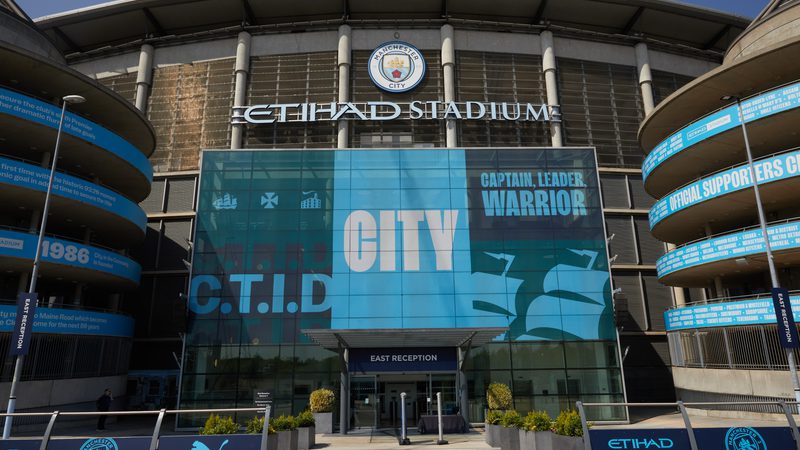The Digital Omnibus — proposed key changes to EU data protection obligations

We break down the key proposed reforms in the Digital Omnibus Package and outline what businesses should do to prepare.
Read more
We make the difference. Talk to us: 0333 004 4488 | hello@brabners.com
AuthorsLydia Edgar
15 min read

The State of Play Conference 2025 was held at Etihad Stadium — the iconic home of Manchester City FC.
At Brabners’ State of Play Conference 2025, senior decision-makers, subject matter experts and leading voices from across the world of sport delved into sports technology — including new advancements, social responsibility, opportunities and challenges.
Here, our Head of Sport Lydia Edgar reflects on the discussions of the day and shares key takeaways.
Jump to:
Our four panel sessions:
And, watch the highlights from the day below.

The day commenced with a fireside chat between Lydia Edgar, Partner & Head of Sport at Brabners and double Olympic triathlon champion Alistair Brownlee MBE. Their conversation explored the intersection of elite sport, cutting-edge technology and the mindset required to succeed both on the track and in the world of business.
Alistair began by reflecting on how technology has shaped his career as a professional athlete. He spoke candidly about the evolution of training tools — from the early days of basic heart rate monitors to the current landscape of advanced wearables and data analytics. He described how innovations like carbon-plated running shoes marked a “step change” in performance, while other developments, such as GPS tracking and physiological monitoring, have progressed more gradually but no less significantly.
When asked about the role of data in his training, Alistair shared a principle that has guided his approach: “if the data you collect today doesn’t influence what you do tomorrow, it’s of no real value”. He explained how the integration of multiple data streams — such as sleep quality, heart rate variability and training load — can help athletes make smarter decisions and reduce the risk of injury. While he acknowledged that we are not yet at the point of fully automated training prescriptions, he believes we are moving closer to systems that can offer meaningful, real-time insights.
The conversation also touched on injury prevention, which Alistair described as one of the most important aspects of long-term athletic success. He highlighted how wearable technology now allows athletes to monitor biomechanical and physiological stress in ways that were once only possible in a lab. This, he said, is helping athletes train more consistently and avoid the setbacks that can derail a season or a career.
On the topic of mental wellbeing, Alistair offered a refreshingly honest perspective. Rather than relying on apps or digital tools, he found solace in disconnecting from technology altogether. For him, the act of training without data — just being outdoors and moving — was a form of mental reset. His preparation for competition was rooted in confidence built through meticulous planning and attention to detail, rather than digital optimisation.
The discussion then shifted to Alistair’s growing involvement in the tech investment space. What began as equity-based sponsorships evolved into a more formal role with a UK-based consumer venture capital firm. Alistair now focuses on startups in the health, wellness, and fitness sectors—areas he believes are not only commercially promising but socially impactful.
Drawing parallels between sport and entrepreneurship, Alistair spoke about the importance of self-responsibility and resilience. Just as athletes must take ownership of their performance, founders must be accountable for their decisions. And just as athletes face daily setbacks, entrepreneurs must navigate constant challenges with determination and adaptability.
For young athletes, Alistair’s advice was clear: embrace technology, but don’t lose sight of the basics. Training, rest, and nutrition still account for the vast majority of performance. “Focus on the 95% before chasing the 1%,” he said, referencing the often-overused concept of marginal gains.
To entrepreneurs, he offered encouragement and optimism. The health and wellness sector is growing rapidly, driven by a younger generation that is increasingly prioritising preventative health. Startups that can remove barriers to participation in sport and wellbeing, he said, are not only well-positioned for success—they’re doing something genuinely meaningful.
The session concluded with a discussion on the rise of eSports and virtual training environments. As a member of the International Olympic Committee’s (IOC) eSports Commission, Alistair shared insights into how the Olympic movement is embracing active eSports and digital engagement. While he doesn’t believe virtual sport will replace traditional competition, he sees it as a powerful tool for accessibility and inspiration.
Alistair’s reflections were thoughtful, grounded, and deeply insightful. Whether speaking about elite performance, personal wellbeing, or the future of sport tech, he offered a compelling vision of how purpose and innovation can go hand in hand.
This panel session explored how innovation is reshaping the way athletes train, compete and recover, with a focus on the intersection of data, ethics and performance.
Chaired by Barry McNeill (Co-Founder & COE of Bloom Sports Partners), the session featured insights from Fiona Green (Founder of Winners of ProDataStack), Dr. Phil Batty (Consultant in Sport & Exercise Medicine at Cleveland Clinic London) and Professor Andy Miah (Chair in Science Communication and Future Media at the University of Salford).
During this panel session, Fiona Green highlighted the growing role of data in empowering athletes at all levels — not just elite performers. Her work with ProDataStack demonstrates how performance metrics, fan engagement insights and brand analytics can be harnessed to support athlete development and commercial growth. This shift towards data-driven decision-making is enabling athletes to take greater control of their careers and prepare for life beyond sport.
Professor Andy Miah brought a bioethical perspective to the conversation, reflecting on the evolving boundaries of performance enhancement. He pointed to the increasing influence of artificial intelligence in sport, referencing the International Olympic Committee’s AI agenda. Professor Miah suggested that AI could democratise access to high-performance tools, particularly for underfunded sports and nations, while also raising important ethical questions.
Dr. Phil Batty, drawing on his extensive experience in elite sport medicine, discussed the transformative impact of wearable technology and real-time biometric data. He emphasised the importance of focusing on foundational health and performance indicators, cautioning against an overreliance on marginal gains.
A recurring theme throughout the session was the importance of culture in the adoption of new technologies. Sports with a tradition of innovation — such as Formula 1 and SailGP — are often more agile in integrating new tools, while others may be slower to adapt. The panel also stressed the need for data to be translated into meaningful insights, with storytelling playing a key role in driving both athlete development and commercial strategy.
The session concluded with a thought-provoking discussion on the proposed 'Enhanced Games' — a competition that permits performance-enhancing drugs under medical supervision. While the panel acknowledged the philosophical and scientific complexities, they expressed concern about the broader implications and motivations behind such initiatives.
Overall, the session underscored the need for a balanced approach to technology in sport — one that embraces innovation while safeguarding athlete welfare and the integrity of competition.
The discussion for this panel centred around the modernisation of business operations within the sports sector to optimise and maximise fan engagement, performance and operational models.
This panel session was chaired by Colin Bell (Partner and Head of Intellectual Property and Technology at Brabners) and featured insights from Hugo Sharman (Strategic Advisor, formerly CEO of Stream AMG), Andy Fletcher (Vice President of Digital Product and Technology, Liverpool FC), Dan Burton (Co-Founder, Phokus) and Charles Greenwood (Founder, Sports Loft).
A key insight from the panel was the recognition that for many fans — especially those outside the UK —television and online media are now the primary gateways to sport. Andy noted that the days of simply walking up to a stadium to watch a match are largely gone. “The first engagement now is TV or online,” he said. “That’s how people experience the club for the first time.”
This shift has profound implications for how clubs design their digital strategies. It means that broadcast quality, online presence and digital storytelling are no longer secondary — they are central to fan acquisition and retention. Clubs, businesses and governing bodies must now think of their digital platforms as the front door to their brand, offering immersive experiences that mirror the excitement of live attendance.
Dan Burton, co-founder of Phokus, emphasised the need for purpose-built systems that centralise fragmented data. His company’s mission is to provide intuitive, data-driven tools tailored for sports organisations. “It’s about enhancing business processes to drive outcomes,” Burton explained. “We’re moving away from marketing everything to everyone and toward surgical, data-informed engagement.” This shift is enabling clubs and federations to understand their audiences more deeply — what they consume, how they engage and what drives their loyalty.
Building on this, Liverpool FC was used as an example of an organisation leveraging data and technology to build deeper, more personalised relationships with its global fanbase. Andy Fletcher, Vice President of Digital Product and Technology at Liverpool FC, highlighted that digital transformation is multi layered, with a focus on both existing and new audiences. Hugo Sharman, former CEO of Stream AMG and now a strategic advisor, reinforced that view, stating that “The sports business has incredible value and the opportunity lies in building tighter, more meaningful relationships with fans.” He pointed to the importance of moving beyond vanity metrics and focusing on qualitative insights — what fans value, how they behave and how to serve them better.
One of the most candid moments of the panel came when Hugo addressed the so-called “streaming bubble.” Several years ago, the industry was abuzz with the promise of OTT (over-the-top) platforms revolutionising sports broadcasting. Rights holders envisioned bypassing traditional broadcasters and going direct-to-consumer, unlocking massive new revenue streams. However, the reality has been more sobering. “In the main, it disappointed massively,” Hugo acknowledged that people flooded into the space expecting it to be lucrative but “it just didn’t happen.”
While some organisations have built successful owned-and-operated platforms, many others found the costs, complexities and marketing challenges insurmountable. The lesson? Streaming is not a silver bullet. It requires a sophisticated understanding of fan behaviour, robust data infrastructure and a clear value proposition. That said, the panel was optimistic about the next phase of streaming — one that blends platforms like YouTube with club-owned channels, using data to manage fan funnels and deliver personalised experiences. The future lies not in abandoning streaming, but in evolving it.
Charlie Greenwood, founder of Sports Loft, discussed the challenge sports organisations face in keeping up with rapid technological change. “Executives are pitched by dozens of tech companies every month”, he noted. “The real value lies in understanding how to apply these technologies meaningfully.” Sports Loft itself has evolved into a hub for connecting sports organisations with cutting-edge tech, helping them navigate the noise and focus on solutions that drive real impact. The panel warned over data being a double-edged sword. While it offers immense potential for responsive decision-making, the panel cautioned against chasing data for its own sake.
A balance however must be struck. This was underlined when Andy spoke candidly about Liverpool FC’s role in one of the UK’s most economically deprived areas, as an organisation with great wealth. “We have to strike a balance,” he said. “Our content and tone of voice reflect our commitment to the community.” Digital platforms are not just tools for monetisation — they are vehicles for storytelling, inclusion and social impact.
This panel session explored how technology is being used to promote fairness, inclusion and accountability in sport — and whether it’s truly helping to “level the playing field.”
The session was chaired by Ruth Hargreaves (Partner at Brabners with a wealth of experience in the NGB sector) and featured insights from Kofi Josephs (professional basketball player and founder of Why Not I), Jake Marsh (Head of Signify Sport), Sanjay Bhandari MBE (Chair of Kick It Out) and Zoe Shackleton (Head of HR & EDI at Huddersfield Town FC).
The panel began by considering how technology is being used to reduce bias and improve access. Zoe Shackleton explained how Huddersfield Town uses applicant tracking systems and blind recruitment tools to help remove personal identifiers from job applications. However, she also stressed the importance of flexibility — noting that not all applicants have equal access to digital platforms and that inclusive recruitment must go beyond the tech itself.
Sanjay Bhandari MBE offered a broader view, highlighting the role of technology in driving social impact across football. He described how Kick It Out uses digital tools to deliver education, connect underrepresented talent with opportunities and advocate for systemic change. However, he also warned that technology must be used responsibly — and that it should be seen as a tool to support people, not replace them.
Jake Marsh provided a powerful insight into the scale of online abuse faced by athletes and officials. He explained how Signify AI uses machine learning and human moderation to detect and triage abusive content, allowing clubs and governing bodies to take real-world action. Jake shared examples from football and rugby, showing how enforcement and visibility can lead to measurable reductions in abuse.
Kofi Josephs brought a personal and emotional perspective to the discussion. Drawing on his own experiences of online abuse and mental health challenges, he spoke about the need for preventative care in elite sport. His platform, Why Not I, uses data and AI to track emotional wellbeing in real time — helping support staff intervene before athletes reach crisis point. Kofi emphasised that mental health support should be available to all athletes, not just star performers.
The panel concluded by reflecting on the limitations of technology. While it can be a powerful enabler, it must be guided by people, values and purpose. As Zoe put it, “It starts and ends with people.” The panel agreed that sport must move beyond reactive approaches and begin investing in long-term strategies that prioritise wellbeing, inclusion and integrity.
This panel session, featuring experts including Darshan Chandarana (Founder of Neopath), Andrew Umbers (Partner at Oakwell Sports Advisory) and Mike Fordham (Founder of MPF Sports Advisory) and chaired by Simon Cothliff (Consultant at Brabners) — explored the evolving intersection of sport, technology, and investment — and how these forces are shaping the future of the industry.
As sport undergoes a period of rapid transformation, the panel examined the forces shaping its future and the opportunities that lie ahead. A key theme was the emergence of challenger leagues —innovative formats such as Kings League and TGL Golf — that are redefining traditional sporting structures. These leagues are characterised by their agility, direct-to-consumer models and emphasis on entertainment. While their rise signals a shift in how audiences engage with sport, the panel acknowledged that long-term success remains elusive for many, with only a few achieving commercial viability.
Technology featured prominently in the discussion, with panellists highlighting the growing role of AI, spatial computing and immersive media in enhancing fan experiences and operational efficiency. The consensus was clear — for sports organisations to remain relevant, technology must be embedded from the outset, not retrofitted as an afterthought.
Investment trends were also scrutinised, particularly the influx of private capital into sports properties. While this presents opportunities for growth and innovation, it also introduces tensions between investor expectations and the governance structures of traditional sports bodies. The panel called for clear frameworks to ensure alignment between stakeholders and to safeguard the integrity of sport.
The conversation also touched on the future of women’s sport, with debate around integrated versus standalone formats. The success of initiatives like The Hundred’s double-header matches was noted, though panellists suggested that tailored approaches and dedicated investment would be key to sustained growth.
Finally, the panel underscored the importance of mobile-first strategies in engaging younger audiences. With Gen Z consuming content primarily via smartphones, sports organisations must prioritise personalisation, data-driven sponsorships and direct engagement to remain competitive.
In summary, the panel painted a picture of a sporting world in flux — one where innovation, adaptability and strategic investment will determine the winners of tomorrow.
This year’s State of Play conference highlighted the transformative trends in sport technology that are shaping the sport sector. For those seeking to leverage the opportunities ahead, innovation and adaptability will be crucial for athletes, sports organisations and businesses alike. As we navigate these changes, staying informed and proactive will be key to thriving in this rapidly evolving landscape and responding to challenges as they arise. If you’d like to register your interest for future conferences, please do contact me.
Our highly experienced and specialised legal advisers can help you to navigate the sports technology legal environment. Talk to us by calling 0333 004 4488, send us an email at hello@brabners.com or complete our contact form below.
Lydia Edgar
Lydia is a Partner in our employment and pensions team and leads our sport sector team.
Read more
Loading form...

We break down the key proposed reforms in the Digital Omnibus Package and outline what businesses should do to prepare.
Read more

We explore the consultation background, the regulatory concerns driving it and what it could mean for clubs with existing or future sponsorship deals.
Read more

We explain where generative AI has the potential to damage individuals’ reputations and examine relevant case law from other jurisdictions.
Read more